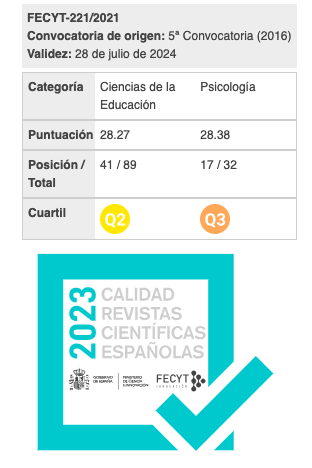Adolescents’ Resilience Evaluation Scale – ARES-i25 and the Analysis of its Psychometric Characteristics
Keywords:
Abstract
This study was designed considering the necessity of a questionnaire (validated on Romanian population and built after consulting the available papers on the subject) for evaluating the resilience of adolescents. It was focused on further developing the ARES ("Adolescents’ Resilience Evaluation Scale”, built in 2018 as a pilot-study, with 62 subjects). This new form (ARES-i25) includes new theoretical aspects, new items and it was completed by 423 subjects. Using factorial exploratory analysis, five factors (which explained 72,1% of the variance of resilience) were identified: tenacity and self-efficiency; self-confidence; learn from life experiences; rapid recovery after trauma; social and familial resources. The reliability was proven by its internal consistency (α= .83 on a general level, and subscales .71<α> .89), while its concurrent validity was proven by .05<r> .75 (comparing the results to those of BRS - Smith et al., 2008) thus proving the adequate psychometric qualities of the new form of ARES-i25. Future studies will focus on extending the sample and on applying ARES-i25 in other countries and creating programs for developing resilience.
Downloads
References
American Psychological Association. (2023). Resilience. In APA dictionary of psychology. Retrieved May 25, 2023, from https://www.apa.org/topics/resilience
Google Scholar CrossrefCahill, H., & Dadvand, B. (2020). Social and emotional learning and resilience education. In R. Midford, G. Nutton, B. Hyndman & S. Silburn (Eds.). Health and Education Interdependence (pp. 205-223). Springer. https://doi: 10.1007/978-981-15-3959-6_11
Google Scholar CrossrefChmitorz, A., Wenzel, M., Stieglitz, R. D., Kunzler, A., Bagusat, C., Helmreich, I., Gerlicher, A., Kampa, M., Kubiak, T., Kalisch, R., Lieb, K., & Tuscher, O. (2018). Population-Based Validation of a German Version of the Brief Resilience Scale. PLoS ONE, 13(2), e0192761. https://doi.org/10.1371/journal.pone.0192761
Google Scholar CrossrefCOGNITROM (2020). Attitudes and Beliefs Scale - II (ABS II). In Cognitrom Assessment System - CAS++, https://www.cognitrom.ro/produs/evaluare-psihologica
Google Scholar CrossrefCOGNITROM (2021a). Cognitive Emotion Regulation Questionnaire (CERQ). In Development Evaluation Platform – PEDb, https://www.cognitrom.ro/produs/evaluarea-dezvoltarii-adolescenti/
Google Scholar CrossrefCOGNITROM (2021b). Endler’s Multidimensional Anxiety Evaluation Scale (EMAS). In Development Evaluation Platform – PEDb, https://www.cognitrom.ro/produs/evaluarea-dezvoltarii-adolescenti/
Google Scholar CrossrefConnor, K. M., & Davidson, J. R. T. (2003). Development of a new resilience scale: The Connor-Davidson resilience scale (CD-RISC). Depression and Anxiety, 18(2), 76-82. https://doi.org/10.1002/da.10113
Google Scholar CrossrefConnor, K. M., & Davidson, J. R. T. (2023). The Connor-Davidson Resilience Scale. https://www.connordavidson-resiliencescale.com/
Google Scholar CrossrefDavidson J. R. T. (2018). Connor-Davidson Resilience Scale (CD-RISC) Manual. Unpublished. 08-19-2018, accessible at www.cd-risc.com
Google Scholar CrossrefDohrenwend, B. P. (2000). The Role of Adversity and Stress in Psychopathology: Some Evidence and Its Implications for Theory and Research. Journal of Health and Social Behavior, 41(1), 1-19. https://doi.org/10.2307/2676357
Google Scholar CrossrefFergus, S., & Zimmerman, M. A. (2005). Adolescent resilience: a framework for understanding healthy development in the face of risk. Annual review of public health, 26, 399–419. https://doi.org/10.1146/annurev.publhealth.26.021304.144357
Google Scholar CrossrefFerrando, P. J., Lorenzo-Seva, U., Hernández-Dorado, A., & Muñiz, J. (2022). Psicothema, 34(1), 7–17. https://doi.org/10.7334/psicothema2021.456
Google Scholar CrossrefFung, S. (2020). Validity of the Brief Resilience Scale and Brief Resilient Coping Scale in a Chinese Sample. International Journal of Environmental Research and Public Health, 17(4), 1265. https://doi.org/10.3390/ijerph17041265
Google Scholar CrossrefGlaveanu, M.S. (2018). Resilience as a mediator between the disharmonic tendencies in personality development and potentially traumatic life events during adolescence. In 5-th International Multidisciplinary scientific conference on social sciences and arts SGEM 2018 Psychology and Psychiatry (pp. 377-384). STEF92 Technology. https://elibrary.ru/item.asp?id=42635017
Google Scholar CrossrefGrazzani, I., Agliati, A., Cavioni, V., Conte, E., Gandellini, S., Lupica Spagnolo, M., Ornaghi, V., Rossi, F. M., Cefai, C., Bartolo, P., Camilleri, L., & Oriordan, M. R. (2022). Adolescents' Resilience During COVID-19 Pandemic and Its Mediating Role in the Association Between SEL Skills and Mental Health. Frontiers in psychology, 13, 801761. https://doi.org/10.3389/fpsyg.2022.801761
Google Scholar CrossrefHjemdal, O., Friborg, O., Stiles, T., Martinussen, M., & Rosenvinge, J. (2006). A New Scale for Adolescent Resilience: Grasping the Central Protective Resources Behind Healthy Development. Measurement and Evaluation in Counseling and Development, 39(2), 84-96. https://doi.org/10.1080/07481756.2006.11909791
Google Scholar CrossrefHu, T., Zhang, D. & Wang, J. (2015). A meta-analysis of the trait resilience and mental health. Personality and Individual Differences, 76, 18-27. https://doi.org/10.1016/j.paid.2014.11.039
Google Scholar CrossrefIonescu, Ş. (2013). Tratat de Rezilienţă Asistată (Ed.). Editura Trei.
Google Scholar CrossrefJanousch, C., Anyan, F., Hjemdal, O., & Hirt, C. N. (2020). Psychometric Properties of the Resilience Scale for Adolescents (READ) and Measurement Invariance Across Two Different German-Speaking Samples. Frontiers in Psychology. Section Quantitative Psychology and Measurement, 11. https://doi.org/10.3389/fpsyg.2020.608677
Google Scholar CrossrefJoseph, S., & Linley, P. A. (2005). Positive Adjustment to Threatening Events: An Organismic Valuing Theory of Growth Through Adversity. Review of General Psychology, 9(3), 262-280. https://doi.org/10.1037/1089-2680.9.3.262
Google Scholar CrossrefKelly, Y., Fitzgerald, A., & Dooley, B. (2017). Validation of the Resilience Scale for Adolescents (READ) in Ireland: a multi-group analysis. International Journal of Methods in Psychiatric Research, 26(2): e1506. https://doi.org/10.1002/mpr.1506
Google Scholar CrossrefKim-Cohen, J., & Turkewitz, R. (2012). Resilience and measured gene–environment interactions. Development and Psychopathology, 24(4), 1297-1306. https://doi.org/10.1017/S0954579412000715
Google Scholar CrossrefKyriazos, T. A., Stalikas, A., Prassa, K., Galanakis, M., Yotsidi, V., & Lakioti, A. (2018). Psychometric Evidence of the Brief Resilience Scale (BRS) and Modeling Distinctiveness of Resilience from Depression and Stress. Psychology, 9, 1828-1857. https://doi.org/10.4236/psych.2018.97107
Google Scholar CrossrefMancini A. D., & Bonanno G. A. (2009). Predictors and Parameters of Resilience to Loss: Toward an Individual Differences Model. Journal of Personality, 77(6), 1805-1832. https://doi.org/10.1111/j.1467-6494.2009.00601.x
Google Scholar CrossrefMesman, E., Vreeker, A., & Hillegers, M. (2021). Resilience and mental health in children and adolescents: an update of the recent literature and future directions. Current opinion in psychiatry, 34(6), 586–592. https://doi.org/10.1097/YCO.0000000000000741
Google Scholar CrossrefMoljord, I. E. O., Moksnes, U. K., Espnes, G. A., Hjemdal, O., & Eriksen, L. (2014). Physical activity, resilience, and depressive symptoms in adolescence. Mental Health and Physical Activity, 7(2), 79-85. https://doi.org/10.1016/j.mhpa.2014.04.001
Google Scholar CrossrefMotti-Stefanidi, F. (2023). Immigrant youth resilience in the context of challenging receiving societies. In L. J. Crockett, G. Carlo, & J. E. Schulenberg (Eds.), APA handbook of adolescent and young adult development (pp. 407–423). American Psychological Association. https://doi.org/10.1037/0000298-025
Google Scholar CrossrefOshio, A., Kaneko, M., Nagamine, S., & Nakaya M. (2003). Construct Validity of the Adolescent Resilience Scale, Psychological Report, 93(3 Pt 2), 1217-1222. https://doi.org/10.2466/pr0.2003.93.3f.1217
Google Scholar CrossrefPopa, M. (2010). Statistici multivariate aplicate în psihologie. Polirom.
Google Scholar CrossrefRobu, V., & Pruteanu, L.M. (2015). Evaluarea rezilienţei adolescenţilor: proprietăţi psihometrice ale unui instrument - Brief Resilience Scale. Revista de psihologie, 61(2), 109-120.
Google Scholar CrossrefRodríguez-Rey, R., Alonso-Tapia, J., & Hernansaiz-Garrido, H. (2016). Reliability and validity of the Brief Resilience Scale (BRS) Spanish Version. Psychological Assessment, 28(5), e101–e110. https://doi.org/10.1037/pas0000191
Google Scholar CrossrefRosenberg, M. (1965). Society and the Adolescent Self-Image. Princeton University Press.
Google Scholar CrossrefRutter, M. (1985). Resilience in the Face of Adversity. Protective Factors and Resistance to Psychiatric Disorder. British Journal of Psychiatry, 147(6), 598-611. https://doi.org/10.1192/bjp.147.6.598
Google Scholar CrossrefSalisu, I., & Hashim, N. (2017). Critical review of scales used in resilience research. IOSR Journal of Business and Management, 19(4), ver. III, 23-33. https://doi.org/10.9790/487X-1904032333
Google Scholar CrossrefSmith, B. W., Dalen, J., Wiggins, K., Tooley, E., Christopher, P., & Bernard, J. (2008). The brief resilience scale: Assessing the ability to bounce back. International Journal of Behavioral Medicine, 15(3), 194-200. https://doi.org/10.1080/10705500802222972
Google Scholar CrossrefTakviriyanun, N. (2008). Development and Testing of the Resilience Factors Scale for Thai Adolescents, Nursing and Health Sciences, 10(3), 203-208. https://doi.org/10.1111/j.1442-2018.2008.00398.x
Google Scholar CrossrefTedeschi, R. G., & Calhoun, L. G. (2004). Target Article “Posttraumatic Growth: Conceptual Foundations and Empirical Evidence”. Psychological Inquiry, 15(1), 1-18. https://doi.org/10.1207/s15327965pli1501_01
Google Scholar CrossrefWorld Health Organization. (2021, November). Mental health of adolescents. https://www.who.int/news-room/fact-sheets/detail/adolescent-mental-health
Google Scholar CrossrefZeleeva, V.P. & Shubnikova, E.G. (2016). Prevention of Addictive Behavior Based on the Formation of Teenagers’ Resilience. International Journal of Environmental and Science Education, 11(8), 2015-2023. doi: 10.12973/ijese.2016.574a
Google Scholar CrossrefPublished
Almetric
Dimensions
How to Cite
Issue
Section
License
Copyright (c) 2024 Simona Maria Glaveanu

This work is licensed under a Creative Commons Attribution 4.0 International License.
All articles are published under Creative Commons copyright (CC BY). Authors hold the copyright and retain publishing rights without restrictions, but authors allow anyone to download, reuse, reprint, modify, distribute, and/or copy articles as the original source is cited.
















